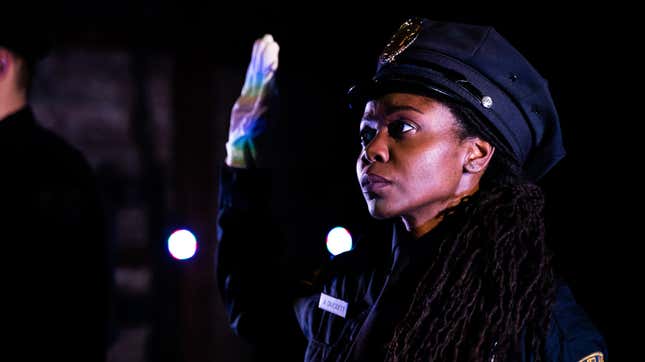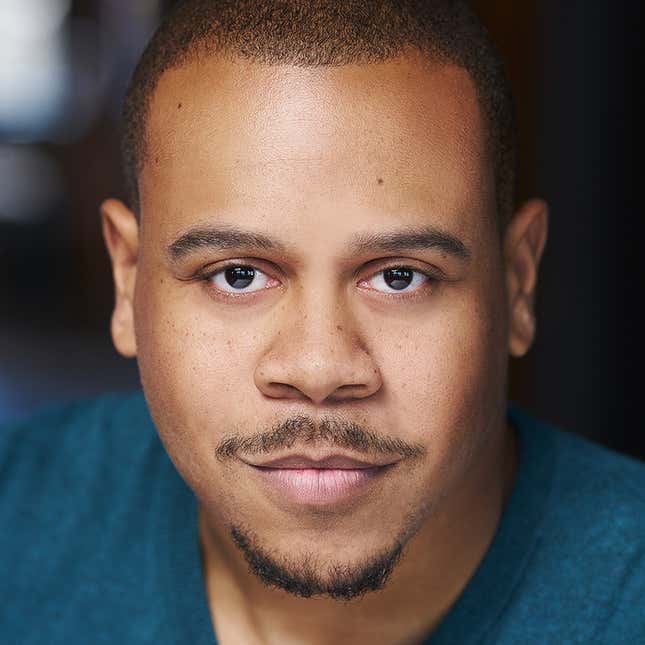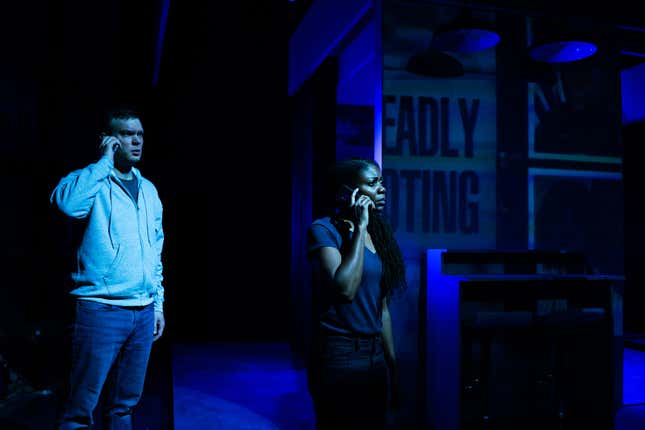
“I like things that subvert the audience’s expectations,” actor/director Wardell Julius Clark told The Root when asked why he gravitates to certain narratives. “We’re going to the theater for a visceral emotional experience; to learn something about ourselves and about humanity.”
Clark is at the helm of two very visceral and emotional productions making their premieres in Chicago’s vibrant theater scene this season: Shattered Globe Theater Company’s staging of Kevin Artigue’s intimate police drama Sheepdog; and the victim-focused Kill Move Paradise, written by James Ijames and produced by TimeLine Theatre Company, where Clark is also associate and teaching artist. Both plays are works of fiction that deal with the all-too-real epidemic and aftermath of police killings in America—and the black men and boys who become collateral damage. Conversely, each takes a unique approach to the collective trauma now shared by much of black America; particularly in Clark’s adopted hometown of Chicago, a city neither unfamiliar with gun violence nor police misconduct.
If art imitates life, perhaps any art centering the black experience is inherently laced with trauma. But as the Fairfield, Ala.-born director recently told local publication New City, using art as activism to tackle issues of social justice is a personal mission.
“All of the plays that I have directed so far deal with some aspect of the black experience juxtaposed against a past, present and future society seeking to invalidate our existence,” he said. “I am drawn to work that illuminates black folks in our current condition while always striving for a more equitable existence in the world.”

That mission led Clark to Artigue’s Sheepdog, a blistering pas de deux centered on the romance between a black female Cleveland police officer and her white male colleague, both members of the already-controversial narcotics unit. The audience watches their unlikely and often enchanting chemistry develop, only to see it subsequently rocked to its core by an officer-involved shooting. Brilliantly acted by Leslie Ann Sheppard (Amina) and SGT Ensemble Member Drew Schad (Ryan), Sheepdog is a meditation on not only interracial love but betrayal—of race, gender, principles, self, and each other—as well as the inextricability of identity, attraction and occupation.
“To be honest, when I read the first 30 pages, I was pissed off,” Clark admits with a chuckle, later adding that he became hooked by the dramatic plot twist in Artigue’s script—and the promise it held for a predominantly white theatergoing audience. “It is important that white people know you can be a good person and still a racist. What I find so fascinating about Sheepdog is that neither Amina nor Ryan are fully innocent or get off the hook in the play. They are both complicit in their own way.”
Even more striking is that Sheepdog is purportedly based on a real Cleveland police officer who made and posted an online video in which she confessed facing a deep conflict within her precinct and herself; specifically, the allegiances between which she felt forced to choose.
“That alone—of someone choosing their own body; her own black body over the institution and the thing that they love is incredibly fascinating to me,” says Clark of Sheepdog’s origin story. Whether that excruciating inner conflict resonates with the majority of those who see the play remains in question.

“White people love Sheepdog; they love that play,” Clark laughs. Nevertheless, to ensure the message is driven home, inside each playbill is a tribute:
In Remembrance: We honor the lives of Jeremie Reid, Kajieme Powell, Keith Lemont, Stephon Clark, Terrance Crutcher, De’Von Bailey, JaQuavon Slaton, Maurice Granton, Patrick Harmon, Terrell Eason, Samual Dubose, Andrew Dixon, Gregory Griffen, Mario Woods, Philando Castile, Walter Scott, Laquan McDonald and the countless others who have lost their lives at the hands of those who have sworn an oath to protect and serve us all.
Those who have lost their lives to police shootings are also at the center of Clark’s concurrent production at TimeLine Theatre, Kill Move Paradise. In a literal limbo, four black men—one arguably a child, discuss their lost lives and tragic fates. At turns gut-wrenching, comic, poignant, and deeply familiar to those of us who know and love black men, the ensemble piece dares audiences to look beyond the headlines to the complex humanity of the black victims often minimized in death to names on an ever-growing list of casualties.
“Kill Move Paradise is as much a remembering piece of how the men got to this cosmic waiting room, but also a full celebration of the humans they were on earth,” Clark explains. “We see so much about the kind of men they were as brothers, as friends, as fathers; their joys, silliness, and their pain. For me, each one of those men experiences such a deep range of emotion that most black [folks] and men definitely never get to share. That alone to me is largely humanizing for an audience,” he adds.
Clark specifically points to a moment that finds one of playwright Ijames’ four male characters—all masculine archetypes—weeping. “In the script, he says: ‘This much pain in a black male body seems to me, forbidden,’” Clark notes, adding, “and that ‘we should honor it for as long as it takes.’”

When asked if the weight of directing these two narratives almost simultaneously was at any point overwhelming, Clark explains that the juxtaposition was strategic.
“I chose to do Sheepdog before Kill Move Paradise because I knew what [Artigue] had written was a white police officer who is actively working to be a good person, but the inherent supremacy structure of law enforcement could not allow him to escape his own racist ideologies, most learned from his growing up and exacerbated by the Narc unit,” he says. “I thought, ‘If I do Sheepdog first, white people will see themselves. They can understand that they can be good people and still racist and still really, really fuck up. And so, when they got to Kill Move they would go on the full journey of who these men are and empathize in a way they wouldn’t be able to do because I already showed them themselves.’”
But the impact is equally profound upon black audiences, particularly the young black students who populate the underserved Chicago schools Clark serves as a teaching artist.
“The general issue of police brutality in Chicago—our long history, coming up to Laquan McDonald—plays very poignantly,” says the director of what it means to have Chicago as the unwitting backdrop for these two plays. “To have such a robust young, black male community here of artists and activists—and also the students that I teach, particularly my South Side students; I know they don’t go see theater often.
“I brought 99 black kids to see Kill, Move, Paradise two weeks ago; their lives were changed, and I knew it would be that way,” Clark continues. “For me, Kill, Move, Paradise is for the culture...all young black people who see that play, they get to see themselves in a way that we never ever get to see ourselves in the piece.”

Both Sheepdog and Kill Move Paradise have garnered rave reviews locally, as has Clark’s direction. But his mission to confront mainstream audiences with the depth of the black experience is ongoing. In the coming months, he’ll take on two more narratives exploring what it is to be young, black and at risk in America: the backstory of LeBron James will take the stage when Clark associate directs the world premiere of Rajiv Joseph’s King James at Chicago’s acclaimed Steppenwolf Theatre alongside Artistic Director Anna Shapiro (Clark will then follow the production west to Los Angeles’ Mark Taper Forum). This fall, he returns to the Steppenwolf for the world premiere of Long Way Down by Jason Reynolds for the theater’s “For Young Audiences” series.
With a growing list of productions and successes under his belt, Clark’s directorial cred is accelerating at an astounding rate. But as he tells The Root, equally important is the evolution of his artistic activism.
“What we do with our art is our revolution,” says Clark. “I seek to do work that leads audiences on a revelatory journey that can also act as a conduit for a better society.”
Shattered Globe Theater’s Sheepdog is in production at Chicago’s Theater Wit through March 15. Kill Move Paradise is on stage at TimeLine Theatre Company through April 5.

